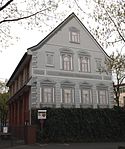Alter Friedhof, Bonn
BonnCemeteries in GermanyEuropean cemetery stubsGerman building and structure stubs

Alter Friedhof (Old Cemetery) is a historically significant cemetery in Bonn, Germany, 1.2 hectares (3 acres) in area, located near the center of the modern city.The cemetery was established in 1715 as a cemetery for soldiers and strangers, outside the city walls of the time. It remained in regular use until the new North cemetery opened in 1884, after which burials gradually ceased. It is an area of greenery in the middle of the modern city.
Excerpt from the Wikipedia article Alter Friedhof, Bonn (License: CC BY-SA 3.0, Authors, Images).Alter Friedhof, Bonn
Bornheimer Straße, Bonn Nordstadt (Stadtbezirk Bonn)
Geographical coordinates (GPS) Address Nearby Places Show on map
Geographical coordinates (GPS)
| Latitude | Longitude |
|---|---|
| N 50.7358 ° | E 7.0903 ° |
Address
Simrock, Karl
Bornheimer Straße
53111 Bonn, Nordstadt (Stadtbezirk Bonn)
North Rhine-Westphalia, Germany
Open on Google Maps









